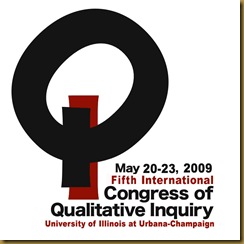This is an 8:00 am session, and is somewhat light with people right now. The title in this presentation is very long, and is about using QDAS with some of the more boundary-pushing qualitative research strategies. This sounds exactly like the sort of presentation I need, as I want to explore which of the software options out there that I want to explore this summer.
I have struggled how to do this with some of the areas of qualitative research I am interested in pursuing. The speaker is speaking about how she was struggling with the experience of the qualitative research class and the art she was doing.
Judith Ann Davidson at U Mass – Lowell is doing a fascinating reflection of where she belongs with the different worlds growing up, especially around issues of gender and cultural norms and expectations. She used collage and poetry as a way of expressing her qualitative findings. She likens this to the multiple forms of visualization that is available in these tools. She suggests using QDAS with performance ethnography, arts-based research, and autoethnography. She then passed around her visual journal project with painting, poetry, and collage.
Kerry Frances Donohoe is now speaking about portraiture and QDAS. She discovered Sarah Lawrence Lightfoot (sound interesting, will have to look her up). She used document analysis, observation, visual data, and semi-structured interviews. She used NVivo as an organizational tool to combine the data. She showed a wonderful image she created for her dissertation using the NVivo Modeler to visually represent her work. NVivo helped with this process to organize what was difficult to traditionally show.
Now Silvana di Gregorio is now speaking about Digital life histories: Digital analysis. She started by speaking how she studied e-research and learning forms that she started to learn more about the great amount of sharing of personal story online (blogging, Web 2.0, etc.)—all without the help of academia! “Lay” life history, such as personal videos, uploading pictures, scrapbooks, and the like—there is a voyeuristic edge in reading the lives of others and wanting to keep parts of our own private. She then spoke about Justin Hall, who began personal blogging in 1994 and then blogged for 11 years. He created a YouTube video during his breakdown. He started to blog to socialize, but then lost all his friends because he revealed too much and ended up being alone. He stopped blogging and then started to gain friends again. Interesting story; have never heard of it before. Will have to look it up. She then spoke about vlogs, and how people often started speaking about how-to things and then this is about their own lives, such as 10-minute life history (such as Dave of Davesfarm in London, Ontario). Flickr and YouTube are both very similar in how their sites are organized. Tagging and folksonomies are enabling community. She even spoke about Google Labs, which is experimenting to searching for the spoken word within videos. Finally, the Semantic Web (Web 3.0) is mentioned, but unfortunately at this point she is racing since she is running out of time.
There was another presentation which I just did not get. I think I may be on overload.
Great question time now, where there was a question about coding images and how reflective memoing works with it, and then link them to the questions. One of the people discussed the powerful memoing tools in NVivo. One person said that the memoing tools are even more powerful to use than the coding tools. Tools such as NVivo are very complicated to learn to use. There are some web tools that are being created and used. There was even a nice discussion about the shelf-life of some of these practices. They then recommended using DiRT (Digital Research Tools) dirt and delicious.
In summary, this is like coding in a new way, and reaching out to the tag rather than staying within a cocoon. Really interesting work moving into the future.
